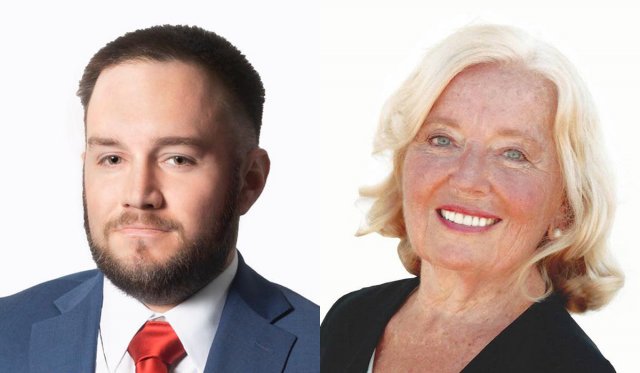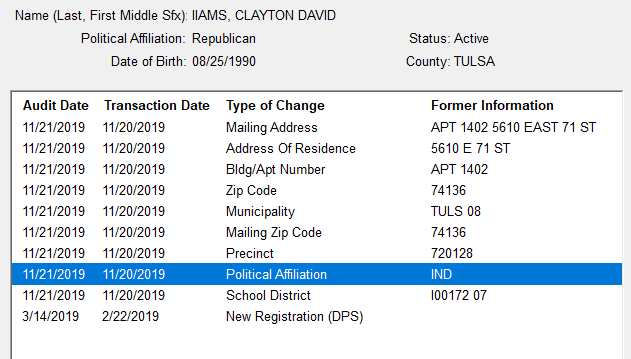
House District 79 Republican candidate Margie Alfonso is no stranger to grime. Earning a bacteriology degree from Michigan State University led her to study a myriad of microorganisms that thrive in filth and muck.
Now, Alfonso hopes to make her way in the drastically different — though sometimes, similarly dirty — field of state politics.
Alfonso is facing an uphill battle, however, as she is locked into a GOP runoff against Marine Corps veteran Clay Iiams, who earned 46 percent of the vote in the June 30 primary compared to Alfonso’s 28 percent.
Despite Iiams outpacing Alfonso and HD 79’s third GOP primary opponent, Maria Seidler, controversy abounds on whether Iiams should ever have been on the ballot in the first place.
Registered Republican … but by when?

According to Oklahoma statute, “To file as a candidate for nomination by a political party to any state or county office, a person must have been a registered voter of that party for the six-month period immediately preceding the first day of the filing period.”
Iiams officially became a member of the Republican Party on Nov. 21, 2019. Iiams had previously been registered as an independent to avoid political affiliation during his time in the Marine Corps, he said.
“That was a personal decision for me. My father always taught me that while it’s not illegal to be political while in the military, I’d always been told that the best practice is to be apolitical while in the service,” Iiams said. “It’s just a personal point for me to not pick a party affiliation. Just as you don’t get to decide your bosses, kind of the same concept with the way that I was taught growing up. Service members don’t get to pick who their boss is. It’s picked by the American people.”
Iiams said he was unclear on whether the time period a candidate was required to be a member of their party for was tracked only in calendar months or specific dates.
“Whenever I reached out to people about running for office, there was just a general count of months,” Iiams said. “November to April being six months, they were like, ‘Hey, you’re close, but you’re good.'”
The first day of the 2020 candidacy filing period fell on April 8, four months and 18 days after Iiams became a registered Republican. But days later when the contest of candidacy window had closed, no one had challenged Iiams’ eligibility.
Following the June 30 primary, Seidler — who received the fewest votes in the election — petitioned to the Oklahoma Supreme Court to assume original jurisdiction and disqualify Iiams’ candidacy.
The court refused to accept Seidler’s request for writs of prohibition and mandamus, stating that the situation did not meet the requirements for such writs to be issued. The court repeatedly mentioned that Seidler failed to use the legal recourse granted to candidates in Title 26 of state statutes, which allows individuals to contest candidacies for state offices and disqualify ineligible candidates.
The Supreme Court concluded it was the duty of the Oklahoma State Election Board to verify the eligibility of its candidates and ruled that “the voters living in House District 79 (had) spoken,” but Alfonso said Seidler still has every right to be outraged.
“I always thought when he violated an oath like that and lied swearing under oath, that it was considered perjury,” Alfonso said. “Something’s wrong in our nation when you can just do that and then keep running for the office that you should not have had in the first place.”
Iiams defended himself by saying, had he been more aware of the law, he would not have filed for this year’s election.
“It was a sin of ignorance. It’s not something that I did with the intent to deceive people,” Iiams said. “While I was personally upset whenever I found out I had made this error, I don’t think we should go outside of the law to try to rectify the situation.”
Alfonso said she feels voters should take the incident into account in the runoff election.
“If you’re going to run for an office, you want to garner trust from your past life, your past experiences [so that] the constituents know that you are a truthful person, that you’re not going to be the best politician money can buy and that you’re going to have a very high moral conduct,” Alfonso said. “When you lie under oath and on a notarized statement, it’s hard to place trust in somebody who flops that off.”
On the issues
Despite Alfonso’s rebuke of Iiams’ candidacy, both Republicans share common ground on an array of issues, one of the most apparent being Second Amendment freedoms.
“There was an attempt earlier this year to repeal constitutional carry,” Iiams said, “and if I’m elected I will be one of the loudest voices in the House to make sure that the people of Oklahoma have their Second Amendment rights as guaranteed by the Constitution.”
According to Alfonso’s campaign website, if elected she will oppose attempts to “restrict any citizen’s right to keep and bear arms (open or concealed), to restrict access to ammunition, or to record the purchase thereof.”
When asked their top priorities, each candidate offered up a different take. Iiams said the number one issue facing Oklahoma in the midst of the COVID-19 pandemic and moving forward will be financial.
“I think the top thing that we need to be looking at as a state is continuing fiscal responsibility in the government, especially with all of the constraints that have been placed on us by COVID-19 and State Question 802 passing,” Iiams said. “It’s going to be more important than ever for the state to pinch pennies and make sure that every dollar is being spent effectively.”
Alfonso instead said handling the state’s education priorities would be her main focus. Alfonso described herself as an advocate for locally controlled education and “common sense policies which will put an end to the plans of big government, big corporations and radical education progressives,” noting specifically her opposition to Common Core curriculum.
“All the federal programs do is they take decisions away from parents and local school boards,” Alfonso said, “and these programs allow the progressives in the Department of Education to indoctrinate — not educate — our kids.”
Recalling her elementary school years in Michigan, Alfonso lamented that children today are not exposed to the same expansive list of “patriotic songs.”
“Every Thursday, at one o’clock, the whole school except for the kindergarteners would gather in the gymnasium,” Alfonso said. “For one hour, we would think patriotic songs like ‘You’re a Grand Old Flag,’ and by the time we we graduated from sixth grade we knew every patriotic song there was.”
Iiams claims ‘a distinct advantage’
The current front runner leading up to the Aug. 25 election, Iiams said he feels he is able to appeal to a wider array of people thanks to his service in the military.
“My ability to work with people from every background gives me a distinct advantage over most people. You know, being overseas, working with foreign militaries, seeing how different cultures operate,” Iiams said. “It gives me an ability to see things from a different perspective that some people might not have. My biggest thing about running for office is I actually think that my voice in my district shouldn’t be the loudest, but on the floor, I want to be a megaphone for the people of House District 79.”
Alfonso says one of her greatest strengths in the race is her long-time dedication to conservative values. The first vote she cast was for Republican presidential candidate and five-term Arizona Sen. Barry Goldwater in the 1964 presidential election, which he lost decisively to President Lyndon B. Johnson.
Alfonso stayed involved in national politics into Ronald Reagan’s presidency, and she said she was even invited to serve as a consultant during the Central American Crisis, a period which saw several Central American nations experience communist political movements and insurrections.
“I have discernment to see where danger lies, and what is really important and what is not important, and to choose those activities and that group or that cause that will be most beneficial to the people around me,” Alfonso said. “I think I get that because my degree was in bacteriology and public health, and public health is when you’re taking care of all the strangers in the world that you don’t know and what things are affecting them in an adverse way.”
Despite his opponent’s decades of additional life experience, Iiams said his military service has prepared him to serve his country in a new way.
“I don’t want to say that I would be better at anything than (Alfonso) because I don’t know her personally. What I bring to the table is a serious commitment to duty. My father, my grandfather, my uncle (and) my mother have all been in the service of this nation,” Iiams said. “I was in the service of this nation for eight years. I’ve seen effective leadership at work, and I’ve seen bad leadership at work, and I can recognize the difference.”
Alfonso said she felt the time was right to give her best to public service.
“I don’t want to leave this earth knowing that I still had great energy and breath,” Alfonso said, “and I could have done something — one more thing — to try to reestablish the liberty and the greatness that our founding fathers had spoken of in their writings.”
The runoff election will take place Aug. 25, after which the winner will face incumbent Rep. Melissa Provenzano (D-Tulsa) in the Nov. 3 general election. An educator by occupation, Provenzano also holds a degree in organismic biology and a master’s degree in educational leadership.
“As a legislator, Melissa continues to bring this same commitment and voice, advocating for the people of Tulsa at the state capitol,” her campaign website states. “The first half of the 57th legislative session brought much positive progress to our state. Working together across the aisle brought help to much needed support and help to working Oklahomans.”





















